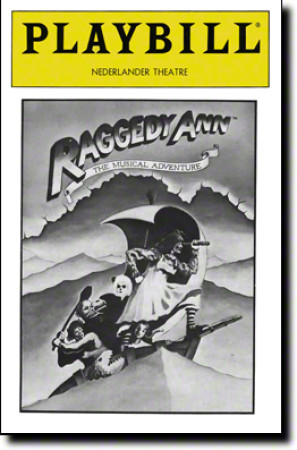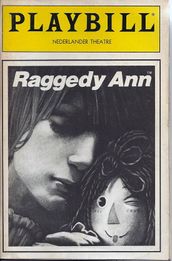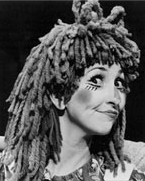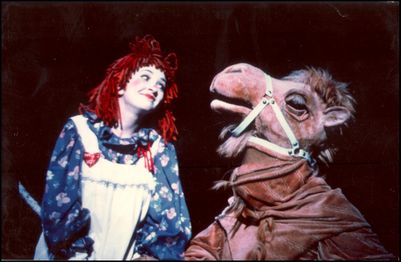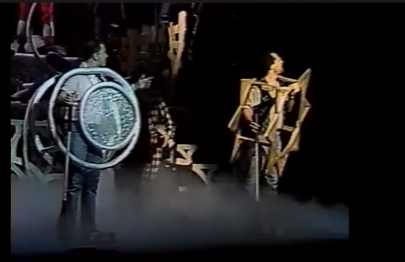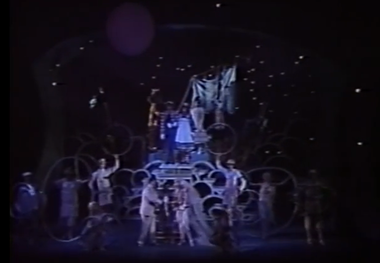Raggedy Ann (found script and footage of Broadway musical; 1985-1986): Difference between revisions
No edit summary |
No edit summary |
||
| Line 3: | Line 3: | ||
|image=RaggedyAnnPlaybillVer2.jpg | |image=RaggedyAnnPlaybillVer2.jpg | ||
|imagecaption=Raggedy Ann Playbill cover | |imagecaption=Raggedy Ann Playbill cover | ||
|status=<span style="color: | |status=<span style="color:orange;">'''Partially Found'''</span> | ||
}} | }} | ||
'''''Raggedy Ann''''' (also known as '''''Rag Dolly'''''), was a Broadway production written by William Gibson, with music and lyrics composed by Joe Raposo, and directed by Patricia Birch. The musical is loosely based off the animated film ''Raggedy Ann and Andy: A Musical Adventure'' (1977), and the ''Raggedy Ann and Andy'' books (1918-1977), but with a | '''''Raggedy Ann''''' (also known as '''''Rag Dolly'''''), was a Broadway production written by William Gibson, with music and lyrics composed by Joe Raposo, and directed by Patricia Birch. The musical is loosely based off the animated film ''Raggedy Ann and Andy: A Musical Adventure'' (1977), and the ''Raggedy Ann and Andy'' books (1918-1977), but with a dark twist. | ||
After the movie's initial release, Joe Raposo was approached by Patricia Snyder to adapt the film into a stage musical, bringing in playwright William Gibson to work alongside them. William wasn't interested in rehashing the animated movie, and took inspiration from the real life story of ''Raggedy Ann'' author Johnny Gruelle's daughter Marcella, who contracted diphtheria from an unsanitary smallpox vaccination and died at the age of 14. | After the movie's initial release, Joe Raposo was approached by Patricia Snyder to adapt the film into a stage musical, bringing in playwright William Gibson to work alongside them. William wasn't interested in rehashing the animated movie, and took inspiration from the real life story of ''Raggedy Ann'' author Johnny Gruelle's daughter Marcella, who contracted diphtheria from an unsanitary smallpox vaccination and died at the age of 14. | ||
| Line 15: | Line 15: | ||
==Controversy== | ==Controversy== | ||
The Gibson/Raposo version of the production was released on December 7th 1984 under the title ''''' | The Gibson/Raposo version of the production was released on December 7th 1984 under the title '''''Rag Dolly'''''. | ||
However, almost immediately after its initial release, controversy arose after Ellen Allen, from Albany, New York, took her children to see the show. Appalled by the musical's dark subject matter, she went to the local news, concluding that the play depicted ''"portrayals of gruesome characters, a mother deserting her child, death and even suicide.”''. This isn't that far from the truth, since it has been said that the play had dark and even sexual themes, with Marcella having nightmares about her mother committing suicide, slaughterhouses and a forest of corpses (allegedly). | However, almost immediately after its initial release, controversy arose after Ellen Allen, from Albany, New York, took her children to see the show. Appalled by the musical's dark subject matter, she went to the local news, concluding that the play depicted ''"portrayals of gruesome characters, a mother deserting her child, death and even suicide.”''. This isn't that far from the truth, since it has been said that the play had dark and even sexual themes, with Marcella having nightmares about her mother committing suicide, slaughterhouses and a forest of corpses (allegedly). | ||
| Line 21: | Line 21: | ||
After the news of the unexpectedly dark play went popular, several public schools' reservations were also cancelled due to this uproar. One of the educational directors said that ''“the themes of alcoholism, suicide and murder were not appropriate for children”''. William Gibson later replied, simply stating ''"The style is for children, the content is for me"''. | After the news of the unexpectedly dark play went popular, several public schools' reservations were also cancelled due to this uproar. One of the educational directors said that ''“the themes of alcoholism, suicide and murder were not appropriate for children”''. William Gibson later replied, simply stating ''"The style is for children, the content is for me"''. | ||
In 1985, the play was retooled to be more "appropriate" for young audiences, renamed '' | In 1985, the play was retooled to be more "appropriate" for young audiences, renamed ''Raggedy Ann'', and the controversy died down. | ||
Despite the bad reviews and controversy the | Despite the bad reviews and controversy the show got in Albany, the reviews were absolutely positive when it performed in Moscow, as seen in the 30-minute documentary ''Rag Dolly in the USSR''. | ||
However, due to the single performance in Moscow, and the mere 5 performances in the United States, the show never made it into historical popularity along with other shows at the time. | However, due to the single performance in Moscow, and the mere 5 performances in the United States, the show never made it into historical popularity along with other shows at the time. | ||
==Lost content== | ==Lost content== | ||
The | The musical itself has almost vanished into obscurity, for around 30 years its been almost completely forgot about, save for a video on YouTube that had a low quality recording of the demo soundtrack and the 30 minute documentary about the shows performance in Russia. However, at the beginning of 2018 a few things involving the show have been found. | ||
An audio bootleg, recorded in 1986 during one of the Broadway performances, has been making its way through the internet, and has been posted on YouTube in its full length. It's low quality, but the bootleg has a new set of songs added to the soundtrack, preexisting songs have been changed, and the song Mexico has been cut. Only recently has the script been found, residing in New York Public Library's archives, and a digital copy is able to be purchased. The script is different than the bootleg, a possible earlier copy, since it contains all the original demo versions of the songs, and a few scenes that are missing from the audio bootleg. | |||
What is still missing is the possibility of extra B-Roll footage from the documentary Rag Dolly in the USSR, which is possibly nonexistent, and the updated script that goes along with the 1986 bootleg. What has been found, is the audio bootleg, one version of the script, | |||
==Gallery== | ==Gallery== | ||
| Line 44: | Line 42: | ||
<div style="width:320px; display:inline-block; margin-right:25px; margin-bottom:0px;"> | <div style="width:320px; display:inline-block; margin-right:25px; margin-bottom:0px;"> | ||
{{#ev:youtube|https://www.youtube.com/watch?v=wp9thGwbmiI|320x240|center|Rag Dolly In The USSR, A Documentary|frame}}</div> | {{#ev:youtube|https://www.youtube.com/watch?v=wp9thGwbmiI|320x240|center|Rag Dolly In The USSR, A Documentary|frame}}</div> | ||
<div style="width:320px; display:inline-block; margin-right:25px; margin-bottom:0px;"> | |||
{{#ev:youtube|https://www.youtube.com/watch?v=eaJnayp3buo&t=6109s|320x240|center|Raggedy Ann - Audio Bootleg|frame}}</div> | |||
</div> | </div> | ||
Revision as of 05:18, 4 February 2018
Raggedy Ann (also known as Rag Dolly), was a Broadway production written by William Gibson, with music and lyrics composed by Joe Raposo, and directed by Patricia Birch. The musical is loosely based off the animated film Raggedy Ann and Andy: A Musical Adventure (1977), and the Raggedy Ann and Andy books (1918-1977), but with a dark twist.
After the movie's initial release, Joe Raposo was approached by Patricia Snyder to adapt the film into a stage musical, bringing in playwright William Gibson to work alongside them. William wasn't interested in rehashing the animated movie, and took inspiration from the real life story of Raggedy Ann author Johnny Gruelle's daughter Marcella, who contracted diphtheria from an unsanitary smallpox vaccination and died at the age of 14.
Plot
The play centered around Marcella (played by Lisa Rieffel) a little girl dying of whatever illness you could think of. Her father (played by Bob Morrisey) is a depressed alcoholic, trying to keep his daughter as happy as she could be, despite her fatal illness, after her mother abandoned the two of them for a man who drives a Rolls Royce.
The father gives Marcella two handmade dolls to cheer her up: Raggedy Ann and Andy. He tells her a story of how when she goes to sleep, all her toys come alive and play in the nursery together. Marcella then falls asleep, and through a movie-length dream sequence, her, Raggedy Ann and Andy, and the rest of the toybox toys go on a vast journey to find the Doll Doctor to save Marcella from an early death. All the while they are being hunted down by General D and his henchmen, who try and stop Marcella from cheating death, and bring her to the afterlife.
Controversy
The Gibson/Raposo version of the production was released on December 7th 1984 under the title Rag Dolly.
However, almost immediately after its initial release, controversy arose after Ellen Allen, from Albany, New York, took her children to see the show. Appalled by the musical's dark subject matter, she went to the local news, concluding that the play depicted "portrayals of gruesome characters, a mother deserting her child, death and even suicide.”. This isn't that far from the truth, since it has been said that the play had dark and even sexual themes, with Marcella having nightmares about her mother committing suicide, slaughterhouses and a forest of corpses (allegedly).
After the news of the unexpectedly dark play went popular, several public schools' reservations were also cancelled due to this uproar. One of the educational directors said that “the themes of alcoholism, suicide and murder were not appropriate for children”. William Gibson later replied, simply stating "The style is for children, the content is for me".
In 1985, the play was retooled to be more "appropriate" for young audiences, renamed Raggedy Ann, and the controversy died down.
Despite the bad reviews and controversy the show got in Albany, the reviews were absolutely positive when it performed in Moscow, as seen in the 30-minute documentary Rag Dolly in the USSR.
However, due to the single performance in Moscow, and the mere 5 performances in the United States, the show never made it into historical popularity along with other shows at the time.
Lost content
The musical itself has almost vanished into obscurity, for around 30 years its been almost completely forgot about, save for a video on YouTube that had a low quality recording of the demo soundtrack and the 30 minute documentary about the shows performance in Russia. However, at the beginning of 2018 a few things involving the show have been found.
An audio bootleg, recorded in 1986 during one of the Broadway performances, has been making its way through the internet, and has been posted on YouTube in its full length. It's low quality, but the bootleg has a new set of songs added to the soundtrack, preexisting songs have been changed, and the song Mexico has been cut. Only recently has the script been found, residing in New York Public Library's archives, and a digital copy is able to be purchased. The script is different than the bootleg, a possible earlier copy, since it contains all the original demo versions of the songs, and a few scenes that are missing from the audio bootleg.
What is still missing is the possibility of extra B-Roll footage from the documentary Rag Dolly in the USSR, which is possibly nonexistent, and the updated script that goes along with the 1986 bootleg. What has been found, is the audio bootleg, one version of the script,
Gallery
References
- https://en.wikipedia.org/wiki/Raggedy_Ann_(musical)
- http://thebroadwaymerman.blogspot.ca/2013/04/underrated-fridays-raggedy-ann-musical.html
- https://orangecow.org/board/viewtopic.php?p=950&sid=3bbe11af28188d7af514be697b400a26
- http://banilsson.blogspot.ca/2012/06/horrors-of-raggedy-ann.html#more
- http://banilsson.blogspot.ca/2012/06/horrors-of-raggedy-ann.html#more
- https://tinyurl.com/lbpy6b4
